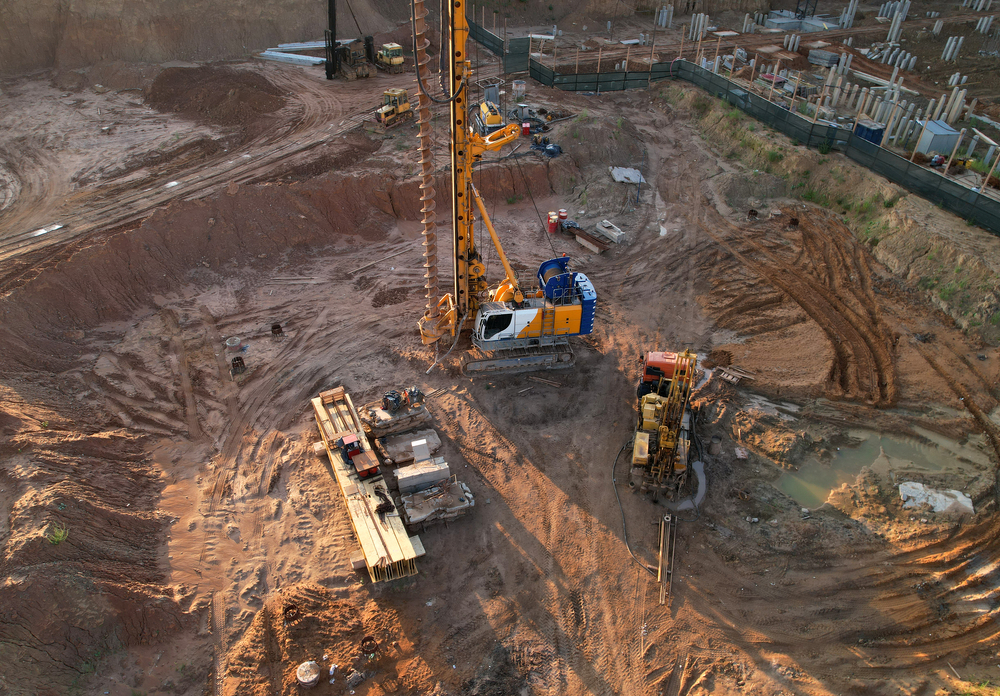The Of Geotheta
The Of Geotheta
Blog Article
Top Guidelines Of Geotheta
Table of ContentsTop Guidelines Of GeothetaThe Best Guide To GeothetaIndicators on Geotheta You Should KnowSee This Report about GeothetaGeotheta - Questions

They perform website examinations, collect examples, carry out lab tests, and assess data to assess the viability of the ground for building and construction jobs - Geotechnical Engineers. Based on their findings, geotechnical engineers offer suggestions for structure design, incline security, maintaining frameworks, and reduction of geotechnical dangers. They team up with other professionals, such as architects, architectural engineers, and building and construction teams, to make certain that geotechnical considerations are incorporated into the overall job layout and execution
By evaluating the behavior and homes of dirt and rock, they can identify possible geotechnical threats such as landslides, soil settlement, or incline instability. Their knowledge aids protect against failings or mishaps that could threaten lives and property. Below are some thorough duties and obligations of a geotechnical engineer: Website Examination: Geotechnical designers conduct website investigations to collect data on subsurface problems.
They interpret the information to recognize the buildings and behavior of the soil and rock, including their stamina, permeability, compaction attributes, and groundwater problems. Geotechnical Evaluation and Design: Geotechnical engineers examine the information gathered during site examinations to assess the stability and viability of the website for building and construction jobs. They perform geotechnical calculations and modeling to assess variables such as bearing capacity, settlement, slope security, side planet pressures, and groundwater circulation.
Geotheta Things To Know Before You Buy
Structure Design: Geotechnical engineers play an essential function in designing foundations that can securely support the intended structure. They analyze the soil conditions and lots demands to figure out the appropriate structure type, such as superficial structures (e.g., grounds), deep structures (e.g (https://www.indiegogo.com/individuals/37984319)., piles), or specialized methods like soil renovation. They take into consideration variables such as settlement limits, birthing capacity, and soil-structure communication to create optimal foundation styles
They examine construction strategies, display website tasks, and conduct area evaluations to verify that the design referrals are complied with. If unpredicted geotechnical issues emerge, they examine the circumstance and give recommendations for remediation or adjustments to the layout. Threat Analysis and Mitigation: Geotechnical engineers analyze geotechnical dangers and risks linked with the task site, such as landslides, liquefaction, or soil erosion.

Collaboration and Communication: Geotechnical designers function closely with various other professionals entailed in a job, such as engineers, structural engineers, and building and construction groups. Reliable communication and partnership are necessary to integrate geotechnical considerations right into the overall job design and building process. Geotechnical designers give technical expertise, answer questions, and ensure that geotechnical demands are fulfilled.
The Definitive Guide for Geotheta
Here are some sorts of geotechnical designers: Foundation Designer: Foundation designers concentrate on creating and analyzing foundations for frameworks. They evaluate the soil problems, lots needs, and site characteristics to identify the most appropriate structure type and layout, such as shallow foundations, deep foundations, or specialized techniques like heap foundations.
They assess the aspects affecting incline security, such as dirt buildings, groundwater conditions, and incline geometry, and develop strategies to avoid slope failings and mitigate dangers. Quake Engineer: Earthquake designers focus on assessing and creating frameworks to endure seismic pressures. They assess the seismic threat of a site, examine soil liquefaction potential, and develop seismic design criteria to guarantee the security and strength of frameworks during quakes.
They carry out field screening, collect examples, and assess the gathered data to identify the soil properties, geologic formations, and groundwater conditions at a site. Geotechnical Instrumentation Designer: Geotechnical instrumentation designers concentrate on surveillance and measuring the habits of dirt, rock, and frameworks. They install and maintain instrumentation systems that keep an eye on variables such as dirt negotiation, groundwater degrees, incline motions, and structural variations to assess performance and provide very early cautions of potential issues.
The Ultimate Guide To Geotheta
They perform examinations such as triaxial tests, consolidation examinations, straight shear tests, and permeability tests to collect information for geotechnical evaluation and layout. Geosynthetics Designer: Geosynthetics designers focus on the design and application of geosynthetic products, such as geotextiles, geogrids, and geomembranes. They make use of these products to improve soil security, enhance slopes, offer water drainage remedies, and control disintegration.
They have a tendency to be investigatory people, which implies they're intellectual, introspective, and investigative. They are interested, systematic, reasonable, analytical, and rational. Some of them are also social, implying they're kind, generous, cooperative, individual, caring, useful, understanding, sensible, and friendly. Does this noise like you? Take our complimentary profession examination to learn if geotechnical engineer is among your leading profession suits.
In the workplace environment, geotechnical designers make use of specialized software program devices to perform estimations, produce layouts, and assess data. They prepare records, testimonial task specifications, connect with customers and employee, and coordinate job tasks. The office setup supplies a favorable setting for study, analysis, and partnership with various other specialists entailed in the task.
Some Known Incorrect Statements About Geotheta
They often check out project sites to carry out website examinations, analyze geotechnical conditions, and gather data for analysis. These brows through include traveling to different locations, often in remote or tough terrains. Geotechnical engineers may execute soil sampling, conduct tests, and monitor building activities to make sure that the geotechnical facets of the project are being applied correctly.
Geotechnical engineers additionally function in specialized geotechnical research laboratories. In these centers, they perform experiments, do tests on soil and rock examples, and examine the engineering residential properties of the materials. Geotechnical laboratory engineers function extensively in these environments, handling screening equipment, running tools, helpful resources and recording data. They collaborate with various other laboratory team to make certain accurate and reputable screening results.
Report this page